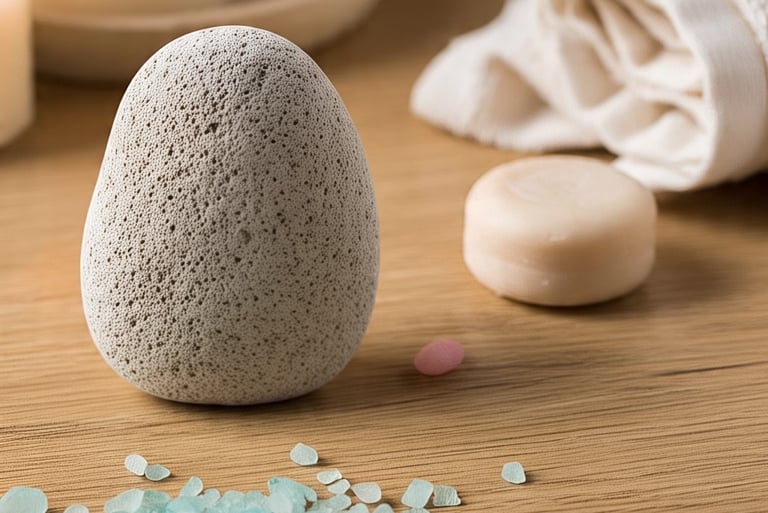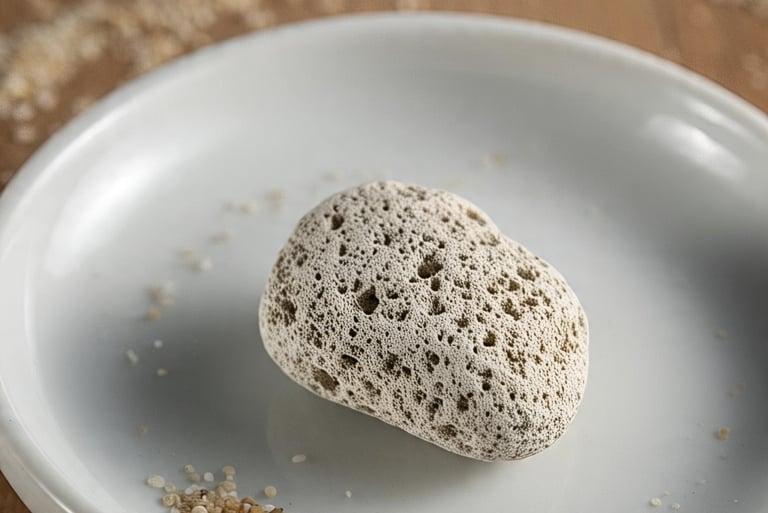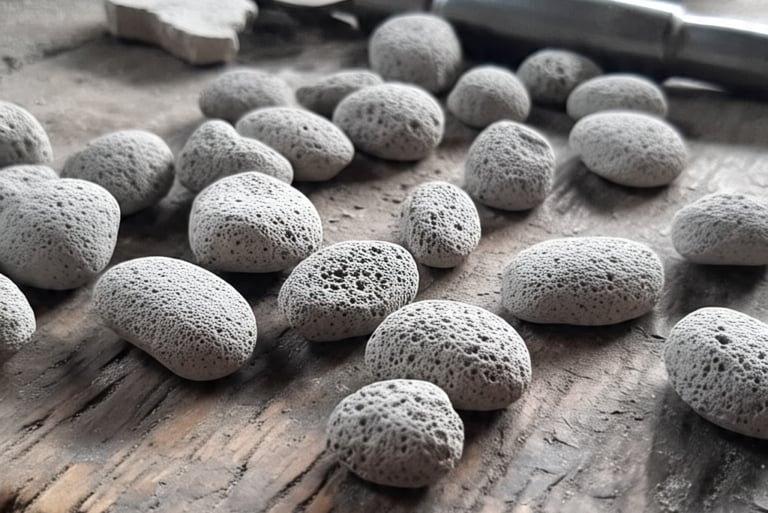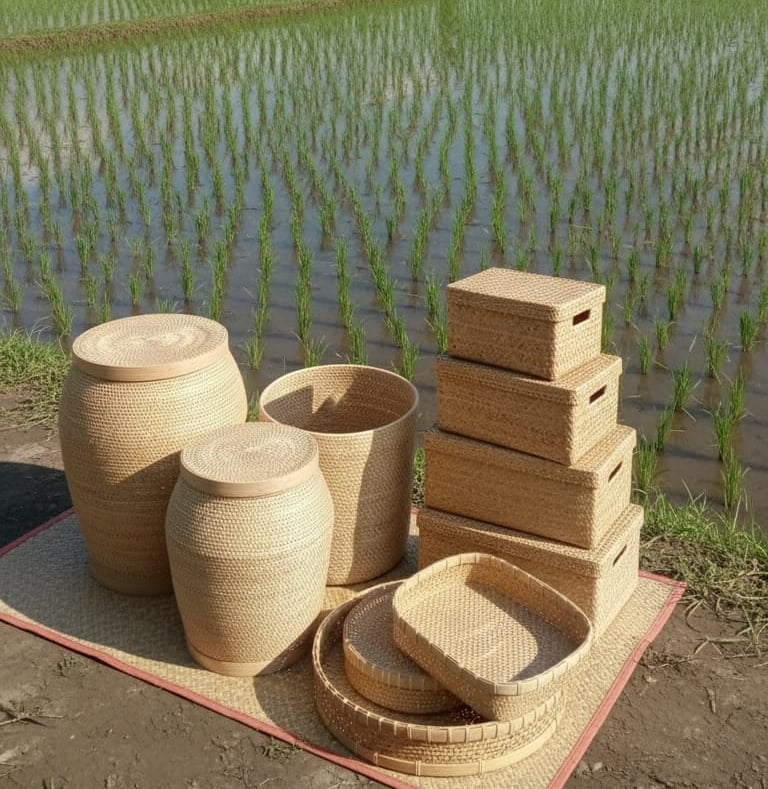





Pumice Stone
Pumice stone is a type of volcanic rock that forms when lava from a volcano cools and solidifies rapidly, trapping gas bubbles inside. This process creates a lightweight and porous structure. Pumice stone is typically gray or white in color and has a rough, sandpapery texture.
What is Pumice Stone?
Properties of Pumice Stone:
Lightweight: Pumice stone is extremely lightweight due to its porous structure.
Porous: Pumice stone has a high porosity, making it ideal for insulation and filtration applications.
Durable: Pumice stone is long-lasting and resistant to damage.
Non-toxic: Pumice stone is non-toxic and safe for use in various applications.
Thermal Insulation: Pumice stone has good thermal insulation properties, reducing heat transfer and energy consumption.
Acoustic Insulation: Pumice stone can also be used as acoustic insulation, reducing noise pollution and improving sound quality.
Uses of Pumice Stone:
Construction Material: Pumice stone is used as a lightweight building material and thermal insulator in construction. It can be used as an aggregate in concrete, insulation in walls and ceilings, and as a decorative element in architecture.
Abrasive: Pumice stone is used as an abrasive in woodworking, metalworking, and leather industries. It is used to smooth and polish surfaces, removing imperfections and scratches.
Cosmetic: Pumice stone is used in skincare and haircare products, such as face and foot scrubs. It helps to remove dead skin cells, smooth rough skin, and improve skin texture.
Landscaping: Pumice stone is used as a decorative element in gardens and landscaping. It can be used as a mulch, a groundcover, or as a decorative rock in garden designs.
Water Filtration: Pumice stone is used as a filtration medium to remove impurities and particles from water. It is effective in removing suspended solids, bacteria, and other contaminants from water.
Horticulture: Pumice stone is used in horticulture as a soil amendment and growing medium. It improves soil structure, increases drainage, and provides aeration for plant roots.
Animal Feed: Pumice stone is used as a filler in animal feed, providing a source of calcium and other minerals.
Waterproofing: Pumice stone can be used as a waterproofing material, reducing water absorption and improving durability.
Benefits of Pumice Stone:
Energy Efficiency: Pumice stone's insulation properties can help reduce energy consumption and costs in buildings.
Sustainable: Pumice stone is a natural, eco-friendly alternative to synthetic materials.
Multi-purpose: Pumice stone can be used in various applications, making it a versatile and valuable resource.
Cost-effective: Pumice stone is a cost-effective material compared to other insulation materials.
Improved Skin Health: Pumice stone's abrasive properties can help improve skin health by removing dead skin cells and smoothing rough skin.
Increased Crop Yields: Pumice stone's use in horticulture can improve soil structure and increase crop yields.
Reduced Water Pollution: Pumice stone's use in water filtration can reduce water pollution and improve water quality.
Industrial Applications:
Cement and Concrete: Pumice stone is used as an aggregate in cement and concrete to improve their strength and durability.
Insulation: Pumice stone is used as insulation in buildings, reducing energy consumption and costs.
Filtration: Pumice stone is used in water filtration systems to remove impurities and particles from water.
Horticulture: Pumice stone is used in horticulture as a soil amendment and growing medium.
Construction: Pumice stone is used in construction as a lightweight building material and thermal insulator.
Manufacturing: Pumice stone is used in the manufacturing of various products, such as abrasives, cosmetics, and animal feed.
Environmental Benefits:
Sustainable Resource: Pumice stone is a natural, sustainable resource that can be mined and used without harming the environment.
Reduced Energy Consumption: Pumice stone's insulation properties can help reduce energy consumption and costs in buildings.
Improved Water Quality: Pumice stone's use in water filtration can improve water quality and reduce water pollution.
Overall, pumice stone is a valuable resource with a range of uses and benefits, from construction and industry to skincare and landscaping. Its unique properties make it an ideal material for various applications.
Pumice stone is a type of volcanic rock that is lightweight and porous. Here's a detailed overview of pumice stone, its uses, and benefits:
Ketak Weaving
"Discover the art of Lombok's Ketak weaving, where nature's fibers meet timeless tradition. Handwoven with precision and love, these pieces bring a touch of island serenity to your home or wardrobe. Perfect blend of functionality and beauty
Each piece tells a story of tradition, craftsmanship, and the beauty of Indonesia's cultural heritage
Need a custom design? We offer bespoke Ketak weaving services to fit your unique style and needs! Whether it's for gifts, decor, or special occasions, let's create something special together.






What is Ketak?
Ketak is a type of plant that grows in tropical regions, including Lombok. The plant has long, straight stems with a hard, fibrous skin. The stems can be used as raw materials to create various types of handicrafts, including woven products.
History of Ketak Weaving
Ketak Weaving has been a part of Lombok's culture for centuries. This traditional craft is believed to have originated in the kingdom era in Lombok, where locals used ketak weaving to create various items such as mats, baskets, and more. Over time, Ketak Weaving has become an integral part of Lombok's cultural identity and continues to evolve to this day.
The Process of Making Ketak Weaving
The process of making Ketak Weaving involves several stages:
1. Raw Material Collection: Ketak stems are harvested and cleaned of their skin.
2. Raw Material Processing: The stems are then cut into thin, straight strips.
3. Dyeing: The strips can be dyed using natural or synthetic dyes.
4. Weaving: The strips are then woven into various patterns and designs.
5. Finishing: The woven product is then shaped into the desired form, such as bags, wallets, or wall decorations.
Types of Ketak Weaving
Ketak Weaving can be made into various types of products, such as:
Bags
Wallets
Wall decorations
Mats
Baskets
And more
Benefits of Ketak Weaving
Ketak Weaving has several benefits, including:
Preserving Lombok's traditional culture
Providing employment opportunities for locals
Producing unique and high-quality products
Generating income for local communities
What makes Ketak Weaving unique?
Ketak Weaving is unique due to its use of natural materials and traditional production methods. The resulting patterns and designs are also distinct and reflect Lombok's cultural identity.
PT EMBUN WAHANA INTERNASIONAL
Perumahan Gunung Sari Indah Blok AS No 17 Karangpilang Surabaya, East Java 60223 Indonesia
+62 813-3056-1770
janira@ewieksport.com

© 2025 - Embun Wahana Internasional
